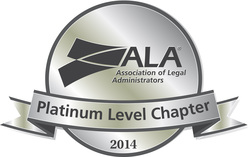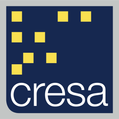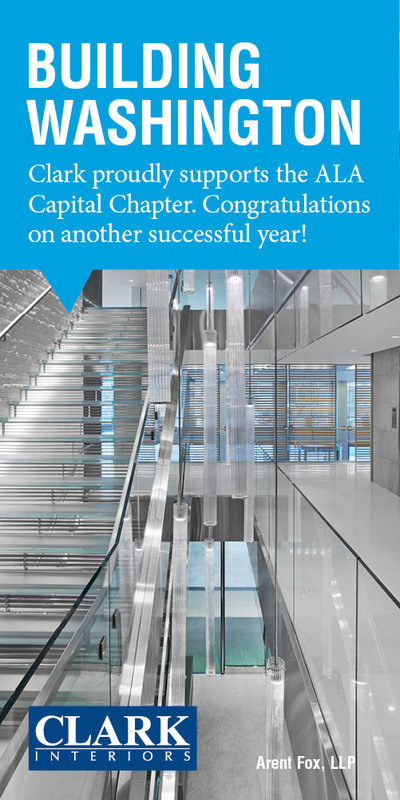| Capital Connection |
January 2015Capital Connection is published monthly for members of the Capital Chapter of the Association of Legal Administrators to provide information for the education and benefit of legal administrators, law office managers, managing partners of law firms, and other law related associations. Capital Connection is not engaged in rendering legal, financial, or tax counseling or advice through this publication. The contents of all articles, letters, and advertisements published in Capital Connection should not be considered endorsements by the Capital Chapter of ALA nor the opinion expressed therein of any products advertised. Contributing authors are requested and expected to disclose financial an/or professional interests and affiliations that may influence their writing position. Articles and materials accepted for publication are subject to editing by the editorial team and become property of the Capital Chapter of the Association of Legal Administrators.
Editor: Paula Serratore Contributing Editors: Joe Berger; Paul Burton Newsletter Designed By: Scoti Dodson |
In this issue: |
|
Administrative Committees
|
Communications and Media Relations
As members of the Newsletter and Media Relations Committee, Chapter members participate in producing the award-winning Capital Connection. Members gather to brainstorm new ideas for editorial themes for upcoming editions. The newsletter reports Chapter business activities such as Section and Committee news and provides information about upcoming educational and other events. It also includes articles of interest to members and other legal management personnel, collected, authored and/or edited by members of the committee. This committee also works with other legal associations and the media to ensure that ALA and the Capital Chapter are represented in the legal industry. The Newsletter Committee welcomes new members. Contact: Jacqueline Moline, [email protected]; Paula Serratore, [email protected] |
Salary Survey
The Salary Survey Committee is responsible for maintaining, updating and running the local survey each year. They review the positions listed, the job descriptions, and the benefits questions to ensure that the survey remains relevant to the end users. The members of the committee also promote the survey within the Chapter to stimulate participation. In addition, the committee is tasked with selling the license to the survey software to other chapters within ALA for use in their locales. They also provide technical support and logistical guidance to those chapters who purchase and utilize our survey software. Contact: Dina Dalecki (Chair), [email protected]; Jeff Delcher (Co-Chair), [email protected] Listserv: [email protected] |
Educational Sections
|
Branch Office Administrators
The Branch Office Adminsitrators Section focuses on a broad range of topics of interest to local adminisraotrs who must coordinate with other officees of their firms. The Section's monthly luncheon meetings, held on the second Tuesday of the month, provide a venue for members to discuss issues of common interest, share ideas, and network. Members are encouraged to raise topics and to recommend speakers. Contact: Richard Gibson (Chair), [email protected]; Wendy Iversen (Co-Chair), [email protected] Listserv: [email protected] |
Intellectual Property (IP)
The Intellectual Property (IP) Section focuses on all aspects of legal management as it pertains to the IP Administrator. The group discusses the complexity of the ever-changing IP environment and how to effectively create and apply IP specific, non-legal procedures in both boutique and general practice firms. The Section's monthly meetings, held the third Tuesday, are primarily lunch meetings and every third month is a dinner meeting. Contact: Kristine Miller (Chair), [email protected]; Dina Dalecki (Co-Chair), [email protected] Listserv: [email protected] |
Human Resources
The Human Resources Section operates as a venue for educational information on global human resources topics and issues. While the Section comprises mostly HR professionals, any member is invited to participate. The Section meets the second Wednesday of every month and often has either industry speakers or roundtable discussions on topics such as recruiting, benefits, strategic planning, performance management, career pathing, retention and more! Contact: Claudia Baragaño (Chair), [email protected]; Jane Schindler (Co-Chair), [email protected] Listserv: [email protected] |
|
Office Operations Management The members of the Office Operations Management Section represent a cross section of legal expertise from functional administrators to branch office managers. The Office Operations Management Section (OOMS) meets on the fourth Wednesday of every month to discuss operations related hot topics. We welcome all members to join the section, especially if you are an administrator in a small law office and you have to wear multiple hats. We can provide you with many best practices to run your operation smoothly. Contact: Gregory Fudge (Chair), [email protected]; Jeffrey Cole (Co-Chair), [email protected] Listserv: [email protected] |
Small Firm Management The purpose of the Small Firm Management Section is to provide Administrators of law firms with 35 or fewer attorneys educational opportunities through vendor presentations, idea sharing and open forums specifically designed for those who work in smaller firms. The Small Firm Management SEction meets the 4th Tuesday of the month at host law firms. Contact: Melody R. Watson (Chair), [email protected]; Emily Christianson (Co-Chair), [email protected] Listserv: [email protected] |
Technology The Technology Section is looking for members to join the group for lively discussions about practical situations we all face daily in the information technology world. With ever-changing IT needs and issues, we will look at our firms' policies and procedures and help develop best practices and speak of the many concerns we all have. Even if you are not in the IT field, your experiences and opinions will help us in bringing all departments of a law firm together and working on the same page. Contact: Kenny Mitchell (Chair), [email protected]; Frank Schipani (Co-Chair), [email protected] Listserv: [email protected] |
|
ALA Capital Chapter Headquarters
2800 Eisenhower Avenue Suite 210 Alexandria, VA 22314 Phone: (703) 683-6101 www.alacapchap.org |
ALACC Capital Connection Questions?
[email protected] Copyright © 2014-2024 by the ALA Capital Chapter All Rights Reserved |









































